Around half of adults are unable to recognise ads in Google’s search results, according to a survey.
This surprising statistic comes from Ofcom’s Adults’ media use and attitudes report, released this month.
While I’ve seen studies suggesting that many people don’t know the difference between paid and organic ads, that 50% could look at a set of results like those below and still not spot them seems bizarre.
The stats
For Ofcom’s study, ‘adults who use search engines’ were shown a picture of the SERPs for ‘walking boots’.
This is what the SERP looks like now, but the study was carried out in 2015, so the shopping results were not there at that time. As the study says:
“Their attention was drawn to the first three results at the top of the list, which were distinguished by an orange box with the word ‘Ad’ written in it. They were then prompted with three options and asked whether any of these applied to these first three results.”
The 1,328 survey respondents were allowed to select more than one answer so, for example, some may have said that the ads were both paid links and the best results.
Understanding of paid-for results returned by Google searches, among adults who use search engine websites or apps:
To clarify the results, 60% identified them as paid links, while 49% identified them only as paid ads, i.e. they selected only the correct answer.
Ofcom also split the results out between newer and more established internet users. Newer users in this case are defined as those who first went online less than five years ago. There were 160 newer users surveyed, and 1,113 older users.
These are the response to the same question as before, just split by old and new:
In a nutshell: newer users were less likely to identify that the results with the yellow ad label were indeed paid results. 34% of newer and 51% of established users gave only the correct answer.
I asked Andrew Girdwood, Head of Media Technology at Cello Signal about the findings. He was pretty surprised:
“I’ve closely followed the evolution of disclosure in search engine ads over the years. At one point the lines were blurred – Yahoo’s paid inclusion, for example, traded your money with for some sort of organic search position. Those days, in Europe and America, are long gone. Regulators on both sides of the Atlantic watch closely.
The ad badge updates to Google’s paid search should have made it crystal clear the listing has been paid for. We’re talking about a bright yellow “Ad” label beside the result. How can you miss it? Searching for competitive keyword? Google returns a whole column of Ad, Ad, Ad and Ad mentions. It leaps off the badge to me.
It is just short of mind boggling that 50% of searchers in the UK can’t see the Ad disclosure. When Steve Krug published “Don’t Make Me Think” in 2000 to offer advice on web usability I wonder if he had imaged an audience that was both digitally savvy and web-blind as this.”
Other studies into PPC ads
I’ve looked at this issues before. In 2014, I reported on stats from UX firm Bunnyfoot, which found that 36% didn’t know that PPC ads were indeed ads (a previous study from the same firm produced a figure of 41%).
This was a relatively small sample – 103 people took UX tests with eye-tracking technology and were asked afterwards if they saw any ads.
With the help of Dan Barker, I carried out further tests on this using two separate polls of more than 2,000 UK internet users in total. We asked:
- Are people aware of the existence of ads on Google Search?
- Do they believe they click Google ads? And, if so, how frequently?
The results were very different to Ofcom’s, with just around 10% not seeing ads in Google results.
However, the very presence of the word ‘ad’ in the question perhaps implied to respondents that there are ads on Google, and gave them a clue about the answer.
There was another study by Varn earlier this year which produced a similar answer to that from Ofcom.
This time, 1,010 Uk internet users were asked the following question. 50.6% couldn’t identify ads:
It is tricky to devise the perfect test for this issue. If you ask users questions, there is the obvious temptation for them to second-guess the answer and say what they think is the right answer, rather than just answering honestly.
The Ofcom test, showing users the results and asking the question seems sound enough to me. Also, that several different studies have found a reasonably high percentage of people not recognising ads, so I can only conclude that there’s something in this.
Why can’t people see the ads?
This is the big question. As someone who has worked in digital for more than 10 years, it’s hard to imagine.
After all, there’s a pretty clear yellow ad label next to the results. You can hardly accuse Google of not disclosing the nature of the link.
However, Google has taken steps which some would interpret as reducing the visibility of ads. Remember, Google has an interest in increasing the number of clicks on its ads.
For example, PPC ads used to be shaded until a couple of years ago, though there were no ad labels.
Recently, Google has experimented with green ad labels. The reason is unclear, but it could be a way to help the ad label blend in with the URL text. Or it could simply be one of a series of experiments to find the best performing format.
I suspect this is a similar thing to banner blindness, in which people have just become immune to, or have learned to ignore the elements on the page that don’t interest them.
Indeed, plenty of eye-tracking studies have shown that users will simply not look at certain elements on a page. Could it be that users are looking at the top results and simply not seeing (or processing) the ‘ad’ label?
Whatever the reason, and whatever the exact proportion of search users who don’t recognise ads in Google, it seems clear that there is an issue here.
The article Do 50% of adults really not recognise ads in search results? was first seen from https://searchenginewatch.com
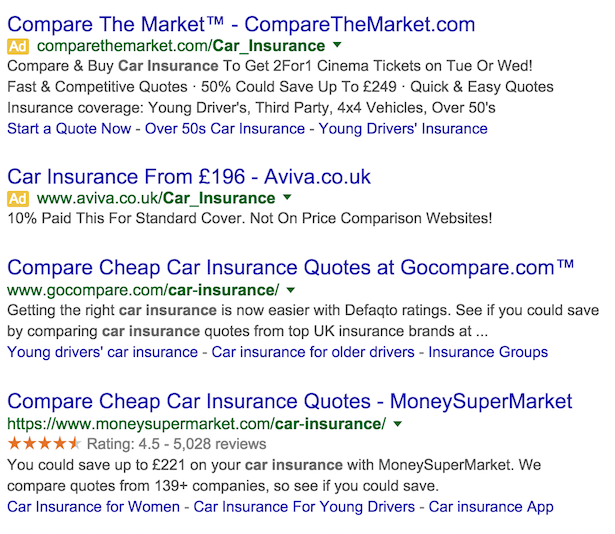
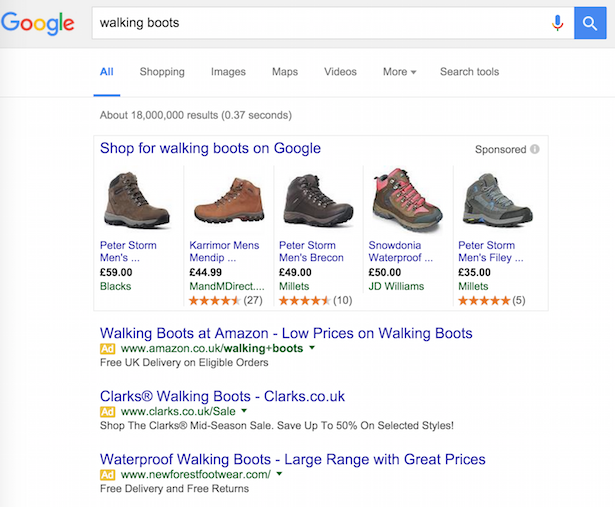

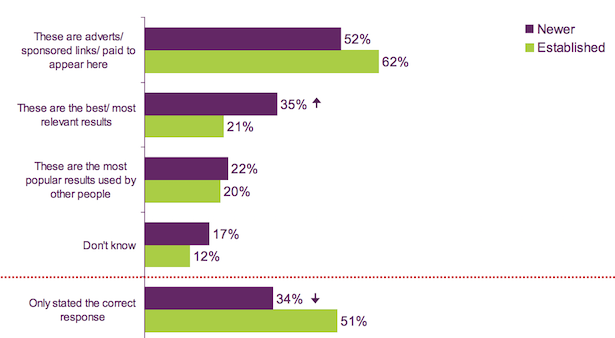
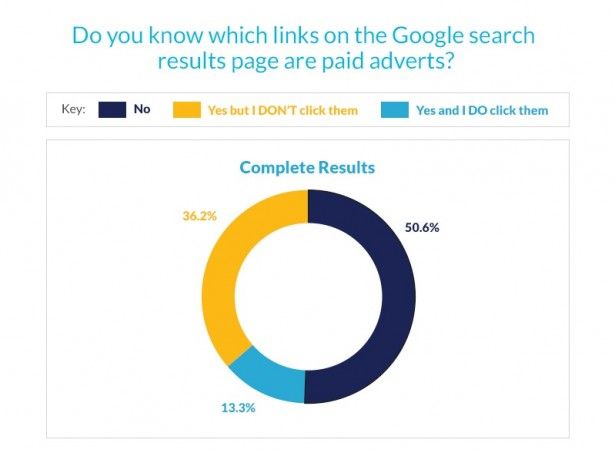
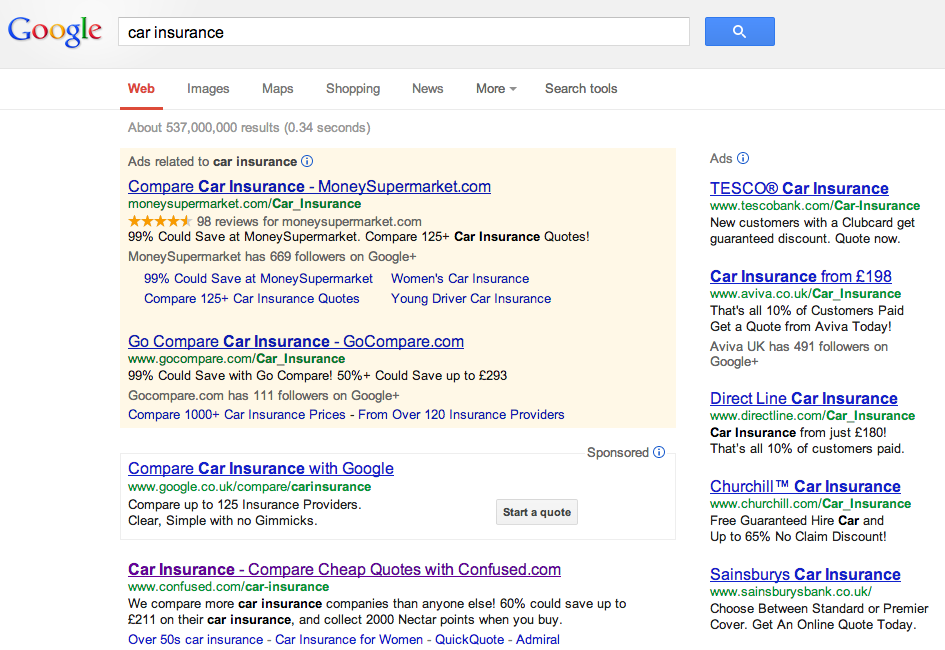

No comments:
Post a Comment